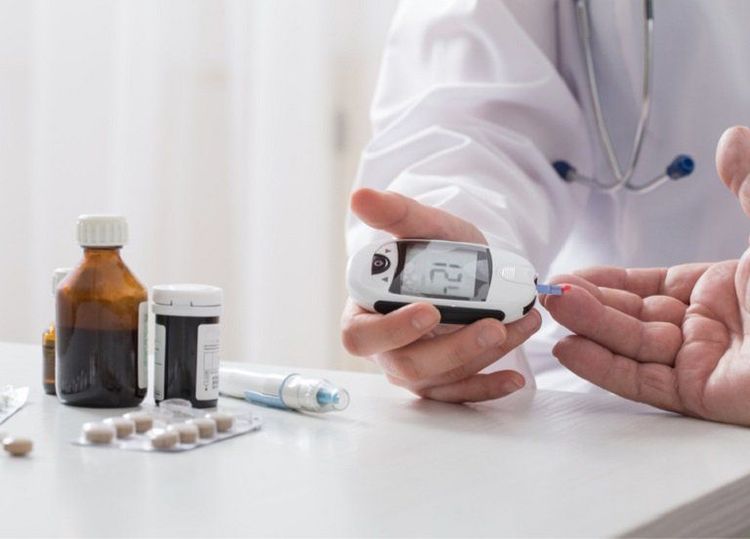This is an automatically translated article.
Posted by Master, Doctor Mai Vien Phuong - Department of Examination & Internal Medicine - Vinmec Central Park International General HospitalPeople with diabetes can experience diarrhea for many reasons, just like any other person. Diarrhea is a symptom of many diseases such as viral or bacterial infections, celiac disease, irritable bowel syndrome, and Crohn's disease. It's a side effect of some medications, such as metformin, and some sugar-free sweeteners that can cause diarrhea in some people.
However, diarrhea can also be a symptom of an autonomic neuropathy. This is what is known as diabetic diarrhea. Although this condition is not uncommon, the diagnosis is usually made only after a detailed history is taken and diagnostic tests have revealed no other cause of the diarrhea.
1. Diabetes and Diarrhea
Diabetes occurs when your body cannot produce or use insulin. Insulin is a hormone that the pancreas secretes when you eat. It allows your cells to absorb sugar. Your cells use this sugar for energy. If your body can't use or absorb this sugar, it builds up in your blood. This causes your blood sugar to rise.The two types of diabetes are type 1 and type 2. People with either form of diabetes experience many of the same symptoms and complications. One of such complications is diarrhea. About 22% of people with diabetes have frequent diarrhea. Researchers aren't sure if this is related to problems in the small intestine or colon. It is not clear what causes persistent diarrhea in people with diabetes.
Most people have had diarrhea at some point in their lives. People with diabetes can often have a significant amount of loose stools at night. Inability to control bowel movements or bowel incontinence are also common in people with diabetes.
Diarrhea may be frequent, or may alternate with periods of regular bowel movements. It can also alternate with constipation.

2. What causes people with diabetes to have diarrhea?
The cause for the link between diabetes and diarrhea isn't clear, but research suggests that neurological disease may be a factor. Neuropathy refers to numbness or pain caused by nerve damage. If you have diabetes, high blood sugar can damage your nerve fibers. This usually occurs in the hands or feet. Neuropathy problems are a common cause of many of the complications that accompany diabetes.Another possible cause is sorbitol. People often use this sweetener in diabetic foods. Sorbitol has been shown to be a potent laxative in small amounts of about 10 grams.
An imbalance in the enteric nervous system (ENS) can also cause diarrhea. Your ENS regulates the functions of your digestive system.
Researchers have also considered the following possibilities:
Bacterial overgrowth Exocrine pancreatic insufficiency Stool incontinence due to anorectal dysfunction Celiac disease The breakdown of sugars in the small intestine incomplete Pancreatic insufficiency People with diabetes can experience diarrhea just like people without diabetes. These may include:
Coffee Alcohol Dairy products Fructose Too much fiber Risk factors to consider
People with type 1 diabetes may be at increased risk of persistent diarrhea. This is especially true for people who struggle with a treatment regimen and are unable to keep their blood sugar stable.
Older adults with diabetes may experience diarrhea more often. This is because the likelihood of diarrhea is increased for people with a long history of diabetes.
3. Characteristics of diarrhea in diabetes
Unlike the more widely known peripheral sensory neuropathy, which affects the hands and feet, autonomic neuropathy damages the nerves that control the body's involuntary activities. Commonly known types of autonomic neuropathy include erectile dysfunction and orthostatic (or postural) hypotension, feeling lightheaded or dizzy when standing after lying down or sitting down.Diabetic diarrhea usually occurs at night, is watery and painless, and may be associated with urinary incontinence. Episodes of diarrhea may be intermittent, accompanied by normal bowel habits that are intermittent or even alternate with periods of constipation.

4. When to see your doctor
You should see your doctor if you have frequent diarrhea. They will review your health record and assess your blood sugar. They may also perform a brief physical exam to help rule out any other medical conditions.Before you start a new medication or another treatment regimen, your doctor will want to make sure you don't have any other digestive problems.
5. How is diarrhea treated?
Treatment may vary. Your doctor may first prescribe Lomotil or Imodium to reduce or prevent future episodes of diarrhea. They may also advise you to change your eating habits. Including high-fiber foods in your diet can help limit your symptoms.The doctor may prescribe antibiotics if the test results show an overgrowth of bacteria in the digestive system. You may also need antispasmodics to reduce the number of bowel movements.
Your doctor may prescribe antispasmodics to reduce the frequency of bowel movements. If an overgrowth of bacteria in the gut is thought to be present, antibiotics may be indicated. Medicines such as clonidine or octreotide, which have other primary uses but have been shown to help with diarrhea, can be used in more severe cases that have not responded to other treatments. Although your primary care physician or endocrinologist can initiate treatment for diabetic diarrhea, a referral to a gastroenterologist may be indicated when standard therapies are not effective.
Depending on their assessment, your doctor may refer you to a gastroenterologist for further investigation.
6. What can you do now
Since neuropathy is thought to be the link between diabetes and diarrhea, preventing the possibility of neuropathy can reduce the likelihood of persistent diarrhea. Neuropathy is a common complication of diabetes, but it is not inevitable. You can help prevent neuropathy by careful and diligent blood sugar control. Maintaining stable blood sugar is an important way to help prevent neuropathy.
7. Methods to help get rid of diarrhea quickly
Anti-diarrheal medicineWhen you have diarrhea, which can be near your home or the bathroom, get plenty of fluids and electrolytes to prevent dehydration.
But what if you can't stay at home?
In this case, taking an anti-diarrheal medicine can reduce or completely eliminate loose stools after the first dose. Look for over-the-counter products like Imodium or Pepto-Bismol, which have loperamide and bismuth subsalicylate, respectively.
The active ingredient in Imodium works quickly because it slows the movement of fluid through the intestines. This can quickly restore normal bowel function. On the other hand, Pepto-Bismol helps to kill the diarrhea-causing bacteria in your gut.
Rice water
Rice water is another quick and effective remedy for diarrhea. Boil 1 cup of rice and 2 cups of water for about 10 minutes or until the water becomes cloudy.
Strain the rice and drain the water. Rice water not only provides fluid to the body to prevent dehydration, but it can also reduce the duration of diarrhea. Rice water has a binding effect in the digestive tract, resulting in firmer stools. Be careful not to overdo rice water as it can increase your blood sugar.
Antibiotics
Diarrhea caused by bacteria or parasites may require antibiotics. In this case, diarrhea can occur after contact with contaminated food or water, often during travel.
Remember that antibiotics are not effective against viral infections that cause diarrhea. This type of diarrhea must be treated definitively.
Vinmec International General Hospital is one of the hospitals that not only ensures professional quality with a team of doctors, modern equipment and technology, but also stands out for its examination, consulting and service services. comprehensive and professional medical treatment; civilized, polite, safe and sterile medical examination and treatment space.
Department of Endoscopy - Gastroenterology is one of the key specialties at Vinmec International General Hospital. For timely examination, advice and treatment of digestive diseases, you can contact Vinmec Health System nationwide or book an appointment on the website for service.
Please dial HOTLINE for more information or register for an appointment HERE. Download MyVinmec app to make appointments faster and to manage your bookings easily.
ReferencesDiabetic Neuropathy. (nd) joslin.org/info/diabetic_neuorpathy_nerve_damage_an_update.html McWilliams, J. (2011, December). How to treat Diabetic Diarrhea? Retrieved from diabforecast.org/2011/dec/how-to-treat-diabetic-di Diarrhea.html Murao, S. (2010, March). Serotonin 5-HT3 receptor antagonists for the treatment of severe diabetic diarrhea. Diabetes Care, 33 (3), Retrieved from care.diabetesjournals.org/content/33/3/e38.full Shefner, JM (2015, March 5). Diabetic autonomic neuropathy uptodate.com/contents/diabetic-autonomic-neuropathy?source=osystem_link














